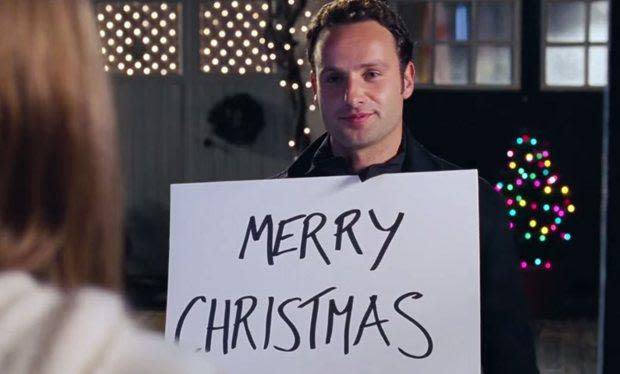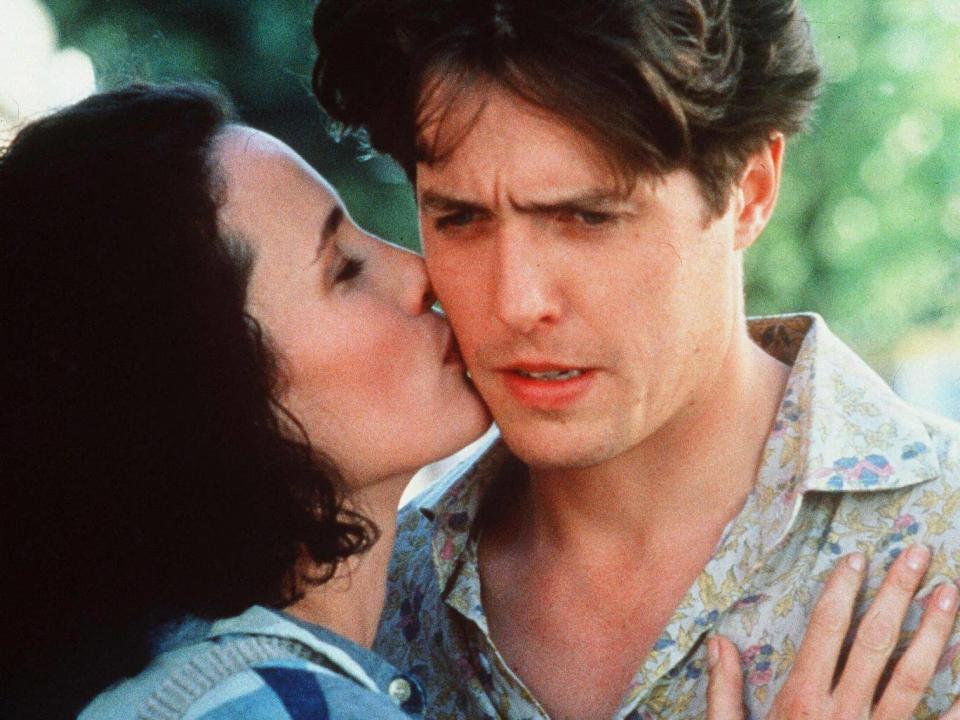Richard Curtis films ranked: From Love Actually to Four Weddings and a Funeral
Last month, comedy writer Richard Curtis appeared at the Cheltenham Literature Festival to discuss his craft.
In addition to the revelation he had hoped to cast the late Alan Rickman instead of Hugh Grant as the lead in Four Weddings and a Funeral (1994), Curtis lamented not writing more about the “complicated” aspects of romantic love while still championing the form.
“We are lucky we live in a country and a world where there is enormous amounts of love and happiness and it’s worth writing that,” he told his audience.
The screenwriter, hugely admired for his work scripting such seminal BBC comedy series as Not the Nine O’Clock News (1979-82), Blackadder (1983-89) and The Vicar of Dibley (1994-2007), has specialised in the genre on the big screen.
While he has deviated from his tried-and-tested formula for two Mr Bean outings with Rowan Atkinson, the pirate radio ensemble caper The Boat That Rocked (2009) and an adaptation of Michael Morpurgo’s War Horse (2011) for Steven Spielberg, his sweary, upper-middle class comedies of manners have proven a wildly popular British export.
Here’s our assessment of his romcoms, ranked from worst to best.
7. Love Actually (2003)
A Christmas Eve mainstay on ITV2, Curtis’s directorial debut summoned an all-star cast to weave together disparate stories about love and relationships during the festive season, with decidedly mixed results.
While Emma Thompson unwrapping a Joni Mitchell album – and therein discovering her husband (played by Rickman) is pondering an affair with a colleague – is absolutely heart-wrenching, much of it borders on the outright ghastly.
Liam Neeson grieving for a late spouse without immediately seeking violent revenge is just tedious, the Laura Linney and Kris Marshall interludes belong in entirely different films (one much better than the other) and Andrew Lincoln’s creepy cue cards rightly became a meme.

Tonally uneven in the extreme, Love Actually did at least predict the advent of Donald Trump through the person of Billy Bob Thornton’s sleazy president. I understand Grant’s prime minister dancing to Girls Aloud also has its fans.
6. Bridget Jones: The Edge of Reason (2004)
In attempting to repeat the success of the blockbuster original about Britain’s favourite hapless singleton, this sequel stuck far too close to its predecessor, hitting the exact same comedic beats one after another. There’s even a tired reprise of the famous Darcy-Cleaver brawl.
The indignities are heaped upon Renee Zellweger thick and fast, from being splashed repeatedly by lorries to humiliation via speaker-phone in front of a room full of diplomats.
She is as adept at pratfalls as ever and an entirely endearing presence but there’s little original here, despite the film’s nod towards a serious theme: what happens after the happily ever after?
5. The Tall Guy (1989)
Inspired by Curtis’s early career as the straight man in Rowan Atkinson’s stage act, The Tall Guy stars Jeff Goldblum as Dexter King, an American living in Camden, who serves as Atkinson’s foil and just can’t take it anymore.
Thompson is vibrant as Goldblum’s love interest, a nurse treating his chronic hay fever, and the film from first-time director Mel Smith is interesting as a time-capsule record of London’s late 1980s comedy circuit, a world of nasty carpets, spilled lager and Madness records.
4. About Time (2013)
Domhnall Gleeson made a game leading man in the writer’s not-wholly-successful attempt to introduce magic realism to Curtisland.
While his character’s discovery that the menfolk of his family can travel through time is riddled with plot holes and logic problems, the film’s Cornish locations are unusual and Bill Nighy is very moving as the dying patriarch, urging his son to make the most of his gifts before it’s too late.
3. Bridget Jones’s Diary (2001)
The casting of Texan actress Zellweger in Curtis’s adaptation of Helen Fielding’s comic novel, which was originally a column in The Independent, caused uproar on announcement but her Method commitment to the role won over all doubters.

By casting Colin Firth – a definitive Mr Darcy for the BBC – it also riffed brilliantly on Jane Austen. Grant, meanwhile, has rarely been more deliciously caddish than as Bridget’s boss and sometime lover Daniel Cleaver.
Some gushing cameos from Salman Rushdie and Jeffrey Archer and the improbable spectacle of Christmas snow in London aside, Bridget Jones is an unmitigated joy if you can overlook its cosily bourgeois values and vision of an England without poverty.
2. Notting Hill (1999)
A film that inspires near-deranged fandom in certain dank corners of the internet, Notting Hill was Curtis’s attempt to repeat the international success of Four Weddings and is arguably the more polished piece.
Drawing loosely on the princess-and-the-everyman plotting of Roman Holiday (1953), the film once again starred Grant as the Curtis stand-in, a travel bookshop opener who quite literally bumps into Hollywood megastar Anna Scott (Julia Roberts) on the street, a textbook example of the meet-cute.
Gina McKee and Hugh Bonneville are touching as Grant’s friends but it’s Rhys Ifans answering the door to the world’s press in his underpants that stays with you, however hard you try to unsee it.
1. Four Weddings and a Funeral (1994)
The original and still the best. Accept no imitations.
Yes, Andie McDowell is wooden as a door and “Is it raining? I hadn’t noticed” is a contender for one of the most ludicrous lines in cinema but it’s still a cracking ending.

Of course, Kristen Scott Thomas’s unrequited love for Charles (Grant) is the real story, lending the film pathos to go along with the punchlines. Her waspish turn as Fiona indicative of the strength in depth of Mike Newell’s cast, which also has terrific supporting work from Simon Callow, Charlotte Coleman, Anna Chancellor and James Fleet.
From the elderly guest who spits, “Don’t be ridiculous! Charles died 20 years ago”, when introduced to Grant’s character of the same name to the boorish public schoolboy who refers to Carrie (McDowell) as a “Damn fine filly... I think I’m in there”, Four Weddings is freighted with comic gold.
John Hannah’s reading of “Funeral Blues” by WH Auden at the memorial for Gareth (Callow), laid low by ceilidh dancing, also belongs to the ages.

 Yahoo News
Yahoo News 
